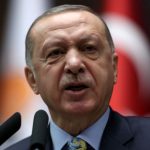Seeking to revive Turkey as an Ottoman-like power, President Recep Tayyip Erdoğan’s revolutionary foreign policy has broken with the West and left Turkey weak, isolated and nearly friendless, a leading Turkey analyst said in the Fletcher Forum of World Affairs, a journal of U.S.-based Tufts University.
“After World War I, Ottoman general Mustafa Kemal Atatürk liberated Turkey from allied occupation, establishing modern Turkey from the ashes of the Ottoman Empire,” Soner Çağaptay, director of the Turkish Research Program at The Washington Institute for Near Eastern Policy, wrote in the Winter 2019 issue of the Fletcher Forum. “Atatürk put into place a secular system of government and then moved his country’s capital from Istanbul to Ankara—geographically and politically signaling Turkey’s turn away from Islam and its Ottoman past.”
Now all that has changed. The cavernous Çamlıca Mosque, a vision of Erdoğan recently completed on the Asian side of Istanbul, is the first ever Istanbul mosque backed by the leader of the Turkish republic, and it highlights Erdoğan’s efforts to make Turkey great again, as Muslims, said Çağaptay.
“Since coming to power in 2003, he has demonised, brutalised, and cracked down on demographics that are unlikely to vote for him,” Çağaptay said. “The groups targeted by Erdoğan constitute nearly half of the Turkish population, ranging from leftists to secularists. And they despise the Turkish leader. By the same token, the other mostly conservative half of the country— comprised of many people that Erdoğan has lifted out of poverty—adores him.”
Crowning the former Ottoman capital, the Çamlıca mosque underscores Erdoğan’s pro-Ottoman pivot, providing an Islamic urban anchor and echoing the sultanic tradition of building mosques atop Istanbul’s hills, said Çağaptay. Erdoğan’s political journey began in Istanbul, where he served as mayor in the 1990s, before becoming Turkey’s prime minister in 2003, then president in 2014.
“In April 2017, Erdoğan won a referendum that significantly increased his powers, delivering him an executive-style presidency,” wrote Çağaptay. “He is now simultaneously head of state, head of government, head of the ruling Justice and Development Party (AKP), and head of the Turkish police and military. He has become the most powerful elected Turkish leader since the country’s first multi-party elections in 1950.”
Erdoğan is a leader of consequence both at home, where he has won thirteen national polls, and abroad. He has sought to cast his country as a stand-alone Middle East and regional power, not as an adherent to the West’s agenda, according to Çağaptay.
In the 19th and 20th centuries, the Ottoman Empire, with its Caliphate, and Turkey, established in 1923 on a secular foundation, primarily aligned their policies with London, Paris, and later Washington, to ensure security. After the Cold War’s end, Turkey’s leaders stayed firm in their commitment to NATO. Then came Erdoğan.
“Over the past decade, the Turkish president has gradually unfolded a revolutionary foreign policy, parting ways with nearly 200 years of tradition of Turkish geo-political alignment,” said Çağaptay. “Before Erdoğan came to power, Turkey perceived itself as a weak or middle power, believing that security comes only through alliance with a superpower or a global bloc. Under Erdoğan, Turkey’s economy has made great strides.”
Backed by this economic growth, Erdoğan abandoned the country’s traditional stance. Going against Atatürk’s idea of non-intervention in neighbor’s affairs, Erdoğan has intervened in Syria’s civil war and engaged more deeply in the Balkans.
“Dubbed ‘Strategic Depth,’ this policy has aimed to restore Turkey’s Ottoman-era influence in the formerly Turkish-controlled Middle East, Balkans, and beyond,” said Çağaptay. “Romanticization of the collapsed Ottoman Empire continues to shape Turkish citizens’ views of their place in the world.”
Erdoğan has rejected the idea of tying Turkey to great powers while working toward his goal, according to the Fletcher Forum article. He has instead moved to cast Turkey as wielding influence over its neighbors, occasionally rejecting Western partners, and seeking new relationships with Russia, Iran, and China.
“Erdoğan has decided to make Turkey great on his watch. Unfortunately, Erdoğan has thus far failed in his quest to earn Turkey great power status. This is especially the case regionally in the Middle East, where Erdoğan’s foreign policy has left Turkey friendless, with the exception of Qatar,” wrote Çağaptay.
In Syria, the Assad government and Turkey’s historic adversaries—Iran and Russia—have overwhelmed Turkish-backed rebels. The jury is still out on Turkey’s outreach efforts in the Balkans, the Sahel, and the Horn of Africa, but Erdoğan’s policies have in general left Turkey weak and isolated, said Çağaptay.
Europe and the United States share part of the blame for Turkey’s current foreign policy stance, according to Çağaptay. Even as Turkey’s leader began in 2007 and 2008 to erode democratic checks and balances by taking over courts and the media and jailing secular intellectuals and military leaders, Turkey’s Western allies continued to promote Erdoğan’s Turkey as a regional model of Muslim democracy.
“Ankara’s involvement in the Arab uprisings shook Turkey from the introverted tradition Atatürk set in the early twentieth century,” said Çağaptay. “As Turkey became more Ottomanist in its foreign policy, Erdoğan’s style of governance became more sultanesque to match.”
He pushed through an executive-style presidency and moved into the 1,100-room presidential palace. Still, half of Turkey’s population—mostly leftists, liberals, and others disillusioned by Erdoğan—has “remained unwilling to kneel to the country’s new conservative sultan”, which has created a political crisis.
Looking abroad, Erdoğan’s efforts to make Turkey great again have had the opposite effect: Ankara has almost no friends in the Middle East while facing pressure from the West and threats from Russia and Iran, particularly in Syria.
“Ankara can no longer rely on the support of its traditional Western allies—most notably Washington, which had kept Ankara under its global security umbrella since the end of the Cold War,” said Çağaptay. “Fully restoring ties with Washington will be among Erdoğan’s greatest foreign policy challenges going forward. Turkey is increasingly on its own in the global arena…With the numerous risks that lie ahead for Turkey, it remains to be seen if Erdoğan can deliver his country back to safety—let alone to greatness.”
Source: Ahval News



